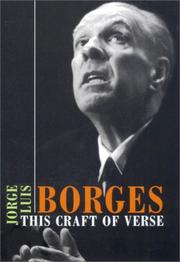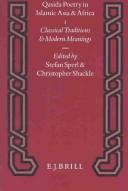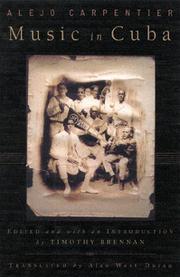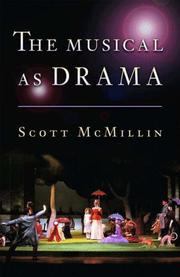| Listing 1 - 10 of 107227 | << page >> |
Sort by
|
Book
ISBN: 9781441177049 1441177043 Year: 2010 Publisher: New York, N.Y. Continuum
Abstract | Keywords | Export | Availability | Bookmark
 Loading...
Loading...Choose an application
- Reference Manager
- EndNote
- RefWorks (Direct export to RefWorks)
Fiction --- History and criticism. --- History and criticism
Book
ISBN: 9780691121895 Year: 2013 Publisher: Princeton Princeton University Press
Abstract | Keywords | Export | Availability | Bookmark
 Loading...
Loading...Choose an application
- Reference Manager
- EndNote
- RefWorks (Direct export to RefWorks)
Fiction --- History and criticism. --- History and criticism
Book
ISBN: 0393021947 Year: 1977 Publisher: New York Norton
Abstract | Keywords | Export | Availability | Bookmark
 Loading...
Loading...Choose an application
- Reference Manager
- EndNote
- RefWorks (Direct export to RefWorks)

ISBN: 0674002903 Year: 2000 Volume: 1 Publisher: Cambridge, Mass. London Harvard University Press
Abstract | Keywords | Export | Availability | Bookmark
 Loading...
Loading...Choose an application
- Reference Manager
- EndNote
- RefWorks (Direct export to RefWorks)
Book
ISBN: 0028713184 0500015031 Year: 1991 Publisher: New York (N.Y.) : London : Schirmer books ; Thames and Hudson,
Abstract | Keywords | Export | Availability | Bookmark
 Loading...
Loading...Choose an application
- Reference Manager
- EndNote
- RefWorks (Direct export to RefWorks)

ISBN: 9004104526 9004102957 9004103872 Year: 1996 Publisher: Leiden Brill
Abstract | Keywords | Export | Availability | Bookmark
 Loading...
Loading...Choose an application
- Reference Manager
- EndNote
- RefWorks (Direct export to RefWorks)
Qasidas --- History and criticism. --- History and criticism

ISBN: 0816632294 Year: 2001 Publisher: Minneapolis University of Minnesota
Abstract | Keywords | Export | Availability | Bookmark
 Loading...
Loading...Choose an application
- Reference Manager
- EndNote
- RefWorks (Direct export to RefWorks)
Book
ISBN: 9781501318351 9781501318368 Year: 2017 Publisher: New York, NY Bloomsbury Academic, an imprint of Bloomsbury Publishing Inc
Abstract | Keywords | Export | Availability | Bookmark
 Loading...
Loading...Choose an application
- Reference Manager
- EndNote
- RefWorks (Direct export to RefWorks)
The groundbreaking Audio Culture: Readings in Modern Music maps the aural and discursive terrain of vanguard music today, highlighting the various rewirings of musical composition and performance that have taken place over the past few decades. The book explores the interconnections among such forms as minimalism, indeterminacy, musique concréte, free improvisation, experimental music, avant-rock, dub reggae, ambient music, hip hop, and techno via writings by philosophers, cultural theorists, and composers. This revised and expanded edition of Audio Culture contains twenty-five additional essays, including four newly-commissioned pieces. It includes writing by some of the most important musical thinkers of the past half-century, among them John Cage, Brian Eno, Ornette Coleman, Pauline Oliveros, Maryanne Amacher, Glenn Gould, Umberto Eco, Jacques Attali, Simon Reynolds, Eliane Radigue, David Toop, John Zorn, Karlheinz Stockhausen, and many others. Each essay has its own short introduction, helping readers place essays within musical, historical, and conceptual contexts. The volume concludes with a glossary, a timeline, and an extensive discography--back cover.

ISBN: 0691164622 1400865409 0691127301 1322239649 9780691127309 9781400865406 9780691164625 9780691164625 9781322239644 Year: 2014 Publisher: Princeton, NJ
Abstract | Keywords | Export | Availability | Bookmark
 Loading...
Loading...Choose an application
- Reference Manager
- EndNote
- RefWorks (Direct export to RefWorks)
Derived from the colorful traditions of vaudeville, burlesque, revue, and operetta, the musical has blossomed into America's most popular form of theater. Scott McMillin has developed a fresh aesthetic theory of this underrated art form, exploring the musical as a type of drama deserving the kind of critical and theoretical regard given to Chekhov or opera. Until recently, the musical has been considered either an "integrated" form of theater or an inferior sibling of opera. McMillin demonstrates that neither of these views is accurate, and that the musical holds true to the disjunctive and irreverent forms of popular entertainment from which it arose a century ago. Critics and composers have long held the musical to the standards applied to opera, asserting that each piece should work together to create a seamless drama. But McMillin argues that the musical is a different form of theater, requiring the suspension of the plot for song. The musical's success lies not in the smoothness of unity, but in the crackle of difference. While disparate, the dancing, music, dialogue, and songs combine to explore different aspects of the action and the characters. Discussing composers and writers such as Rodgers and Hammerstein, Stephen Sondheim, Kander and Ebb, Leonard Bernstein, and Jerome Kern, The Musical as Drama describes the continuity of this distinctively American dramatic genre, from the shows of the 1920's and 1930's to the musicals of today.
Musicals --- History and criticism. --- History and criticism
Book
ISBN: 0090316843 9780090316847 Year: 1978 Publisher: London Hutchinson
Abstract | Keywords | Export | Availability | Bookmark
 Loading...
Loading...Choose an application
- Reference Manager
- EndNote
- RefWorks (Direct export to RefWorks)
| Listing 1 - 10 of 107227 | << page >> |
Sort by
|

 Search
Search Feedback
Feedback About UniCat
About UniCat  Help
Help News
News